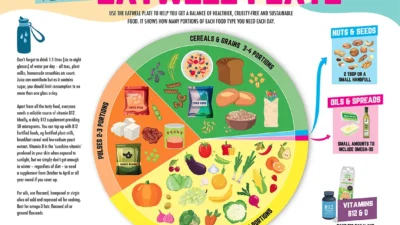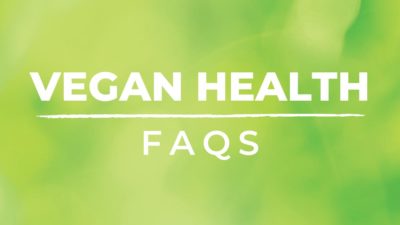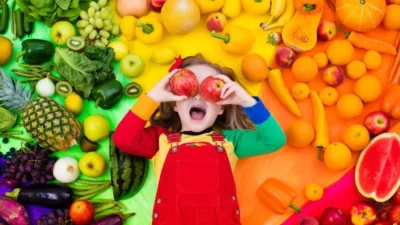The unexpected benefits of a vegan diet

Around 360 million tonnes of meat are consumed globally each year – a figure it’s hard to get your head around. So, Dr Max Roser, director of the Oxford Martin Programme on Global Development at the University of Oxford, and founder and editor of the research publication Our World in Data, has turned it into numbers of animals.
According to Roser, over 200 million chickens, nearly 12 million ducks, 3.8 million pigs, 1.7 million sheep, 1.4 million goats, 900,000 cows and hundreds of millions of fish are slaughtered for food every single day!
It’s estimated that at least three-quarters of land animals are factory-farmed which means that at any given time, around 23 billion animals – almost three times the number of people in the world – are confined in filthy, overcrowded hellholes with no ability to express natural behaviour. Unsurprisingly, most vegans are vegan for the animals. However, there are huge environmental and health benefits to be gained from veganism, in addition to saving animals, as well as a few other surprising benefits.
Environmental benefits
Animal agriculture lies at the heart of all the environmental problems we are facing; from global heating, deforestation, the destruction of ocean ecosystems, to air and water pollution and massive wildlife loss. One million species around the world are at risk of extinction, it may be even more.
Animal agriculture has a huge impact on the planet, emitting a fifth of all greenhouse gas emissions that drive global heating. Recent research shows that a vegan diet produces 50 to 75 per cent less emissions and less water pollution and land use than diets containing meat and dairy. Vegan diets also cut the destruction of wildlife by 66 per cent and water use by more than half. Urgent and drastic action is required now if we are to avert disaster.
Health benefits
Then there are also the health benefits; a vegan diet lowers the risk of obesity, heart disease, diabetes, and certain cancers. Eating a variety of different plant foods has been shown to promote a healthy gut microbiome which can help support your immune system, improve digestive health and reduce inflammation – a key feature of chronic diseases.
Plant-based foods tend to be lower in calories and saturated fats compared to meat and dairy and so some people lose weight simply by making the switch to a vegan diet – providing it’s not based too heavily on processed foods. The higher fibre content of a healthy vegan diet helps you feel fuller for longer and slow-release energy from complex carbohydrates is why some people say they feel more energetic after changing to a vegan diet.
Some people also experience better moods and reduced symptoms of depression or anxiety on a vegan diet. This may be because diets based on processed, high-sugar, high-fat foods and red and processed meats, can activate inflammation, which is not only linked to heart disease, diabetes, cancers and cognitive disorders such as Alzheimer’s disease but also to a higher risk of depression.
Plant compounds called polyphenols, found in fruit, vegetables, tea, coffee, nuts, seeds and dark chocolate, may help combat inflammation and so reduce symptoms of depression. Fruit, vegetables, nuts, seeds, pulses and wholegrains – all staples of a healthy vegan diet – are rich in antioxidants, which may also lower the risk. Vitamin B12 and omega-3 fats are also important and Viva! recommends a daily B12 supplement and ground flaxseed or flaxseed oil, walnuts, hemp seeds, chia seeds, rapeseed oil or a vegan algal-based supplement containing EPA and DHA as a source of omega-3s.
Vegans are much less likely to experience food poisoning caused by bacteria such as Salmonella and E. coli, as meat and meat products are to blame for most cases with fish and dairy foods responsible for much of the rest. If plant foods do cause poisoning, it tends to be because they’ve been contaminated with animal excreta, human sewerage or were handled by people with dirty hands.
Antimicrobial resistance
Around 70 per cent of all antibiotics sold on Earth are used in animals that are raised for food and it may be more as many countries don’t report antimicrobial use in farmed animals. The overuse of antibiotics in both humans and animals has contributed to the rise of antibiotic-resistant ‘superbugs,’ which is now an urgent global public health threat that in 2019, killed 1.27 million people worldwide. If no action is taken, by 2050, the number of people dying from antibiotic-resistant bacterial infections could rise to 10 million a year – more than deaths from cancer. We are fast running out of antibiotics but reducing global meat consumption could preserve the effectiveness of existing ones and halt the rise in resistant superbugs.
Pandemic risk
Reducing global meat consumption would also lower the risk of another global pandemic. Three in four of the world’s new or emerging infectious diseases come from animals and they are appearing with increasing frequency. Swine flu and Covid-19 emerged in recent years while others, including SARS, MERS, Ebola and HIV – all came from animals.
Responsible for three million deaths a year, these zoonotic diseases are largely transmitted through trading in wildlife, exposing ourselves to new pathogens, and factory farming, the latter providing an ideal environment for the mutation and spread of pathogens. if we continue to encroach on wildlife and expand factory farming, the threat of another pandemic looms large. We urgently need to change the way we treat animals.
Lastly, many people find that they save money when they go vegan by focusing on wholefoods and avoiding expensive meat and dairy products. Staple vegan foods such as bread, pasta, lentils, oats, beans, chickpeas and vegetables are delicious, nutritious and among the cheapest foods available – and feature in a host of vegan recipes. A study from the University of Oxford found that a vegan diet is the most affordable and could cut your food costs by a third.
Protecting your pocket
During the current cost of living crisis, many people are facing hard choices and Viva!’s Vegan Recipe Club is a great resource. With hundreds of delicious recipes, it can help to protect your health, save animals and money. Our budget vegan recipes don’t cost an arm and a leg – and no animals will be harmed. Check it out here: v7.viva.org.uk/cheap-as-chips-meal-plan
Returning to where we began, less meat consumption means not only a healthier body and planet but less suffering for animals. It seems entirely plausible that one day, people will look back and find it hard to believe the scale on which animals were slaughtered for food.







